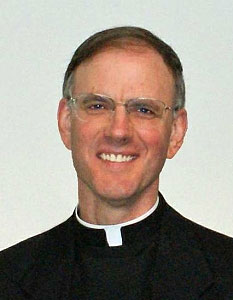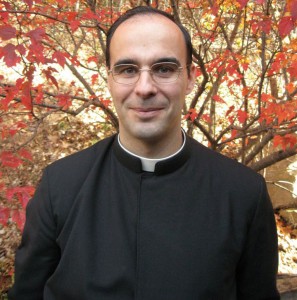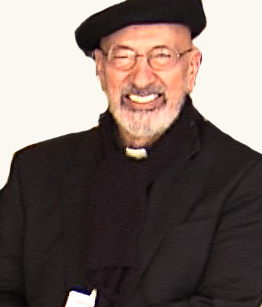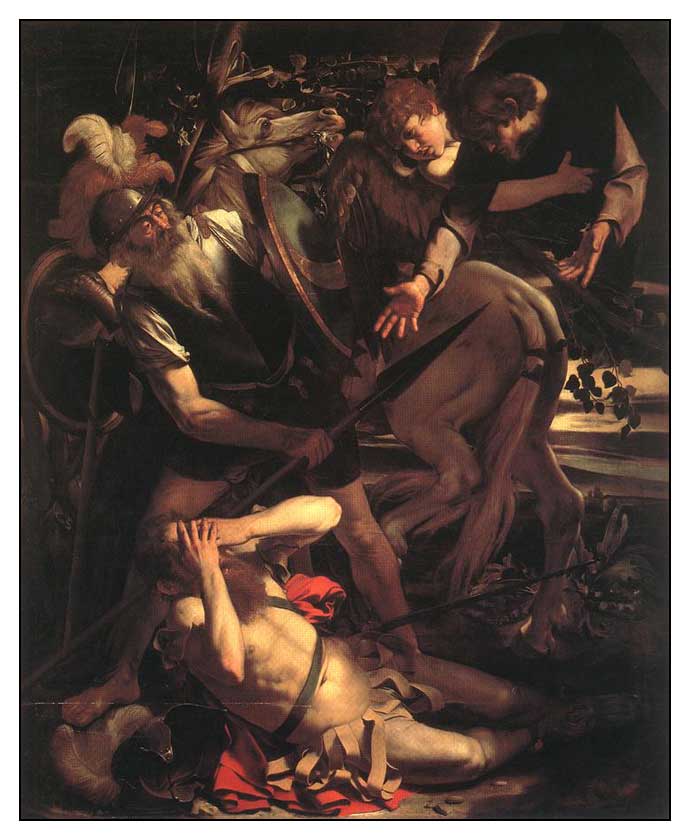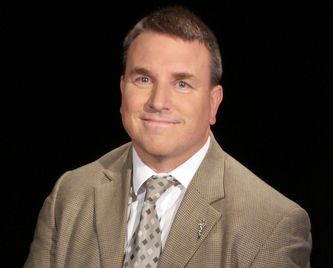 Episode 21 – Great Works in Western Literature with Joseph Pearce – T.S. Eliot and “The Waste Land”
Episode 21 – Great Works in Western Literature with Joseph Pearce – T.S. Eliot and “The Waste Land”
(Of special note: excerpts from “The Waste Land” are read by T. S. Eliot)
[powerpress]
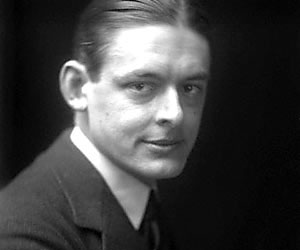 “Eliot’s place as a poet of the highest stature is assured. The Waste Land is the quintessential debunking of modernity and is also, simultaneously, a potent antidote to the poison of postmodernism..”
“Eliot’s place as a poet of the highest stature is assured. The Waste Land is the quintessential debunking of modernity and is also, simultaneously, a potent antidote to the poison of postmodernism..”
–Joseph Pearce -from Nov. 22, 2010 St. Austin Review —
You can find the complete poem here
An excerpt from “The Waste Land” by T. S. Eliot
If there were water
And no rock
If there were rock
And also water
And water
A spring
A pool among the rock
If there were the sound of water only
Not the cicada
And dry grass singing
But sound of water over a rock
Where the hermit-thrush sings in the pine trees
Drip drop drip drop drop drop drop
But there is no waterWho is the third who walks always beside you?
When I count, there are only you and I together
But when I look ahead up the white road
There is always another one walking beside you
Gliding wrapt in a brown mantle, hooded
I do not know whether a man or a woman
—But who is that on the other side of you?
Joseph Pearce is currently the Writer-in-Residence and Visiting Fellow at Thomas More College of Liberal Arts in Merrimack, New Hampshire. He is also Visiting Scholar at Mount Royal Academy in Sunapee, New Hampshire. He is also Visiting Scholar at Mount Royal Academy in Sunapee, New Hampshire. He is co-editor of the Saint Austin Review (or StAR), an international review of Christian culture, literature, and ideas published in England (Family Publications) and the United States (Sapientia Press). He is also the author of many books, including literary biographies of Solzhenitsyn, J. R. R. Tolkien, C. S. Lewis, G. K. Chesterton, and Oscar Wilde.
Tags: joseph pearce, Western Literature
This entry was posted on Tuesday, February 25th, 2014 at 1:59 pm
You can follow any responses to this entry through the RSS 2.0 feed.
Episode 5 -The Way of Mystery: The Eucharist and Moral Living 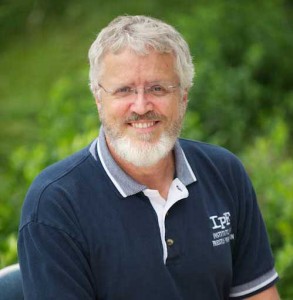
The penitential rite of the mass, while not the pivotal point, it is one of the most important points of the mass, and key in our moral conversion…it’s about the crucifixion to sin, meeting evil with love.
[powerpress]
For more episodes in “The Way of Mystery” Series click here
Deacon James Keating, PhD, the director of Theological Formation for the Institute for Priestly Formation, located at Creighton University, in Omaha, is making available to â€Discerning Hearts†and all who listen, his series of programs entitled “The Way of Mysteryâ€.
 The Vatican II documents remind us that the spiritual journey is not made in a vacuum, that God has chosen to save us, not individually, but as The People of God. The Eucharist must help Christians to make their choices by discerning out of Christ’s paschal mystery. For this process to take place, however, Christians must first understand how the Eucharist puts them in touch with Christ’s passion, death, and resurrection, and what concrete implications being in touch with this mystery has for their daily lives.
The Vatican II documents remind us that the spiritual journey is not made in a vacuum, that God has chosen to save us, not individually, but as The People of God. The Eucharist must help Christians to make their choices by discerning out of Christ’s paschal mystery. For this process to take place, however, Christians must first understand how the Eucharist puts them in touch with Christ’s passion, death, and resurrection, and what concrete implications being in touch with this mystery has for their daily lives.
For more information on the “Institute of Priestly Formation†and for other material available by Deacon Keating, just click here
Don’t forget to pickup a copy of “Communion with Christ†, it is one of the best audio sets on prayer…ever!
Check out Deacon Keating’s “Discerning Heart†page
Tags: Deacon Keating, institute for priestly formation, james keating, the eucharist, theological formation
This entry was posted on Tuesday, February 25th, 2014 at 1:16 pm
You can follow any responses to this entry through the RSS 2.0 feed.
THE WAY OF PERFECTION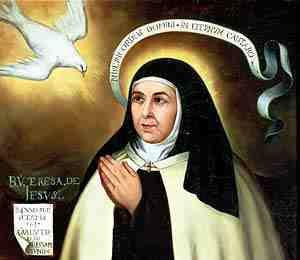
By
St. Teresa of Avila
Chapter 19
[powerpress]
For the pdf containing the complete text and footnotes click here
Begins to treat of prayer. Addresses souls who cannot reason with
the understanding
For other audio chapters of
“The Way of Perfection”
THE WAY OF PERFECTION
by
ST. TERESA OF AVILA
Translated & Edited by
E. ALLISON PEERS
from the Critical Editon of
P. SILVERIO DE SANTA TERESA, C.D.
Tags: st. teresa of avila, The Way of Perfection
This entry was posted on Tuesday, February 25th, 2014 at 9:29 am
You can follow any responses to this entry through the RSS 2.0 feed.
BTP#35 – Identifying and Battling the “Irrational Spirits” – The Mystery of Faith in the Wisdom of the Saints.
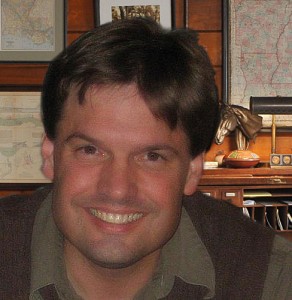
[powerpress]
In this episode Dr. Lilles discusses the nature of prayer. The use of “methods” or “techniques” is cautioned by Dr. Lilles. The relationship with the person of Jesus Christ is paramount. He discusses the struggles in prayer and the real “enemies” which assault us in prayer. He points to the experience and teachings of St. Anthony of the Desert, who battled the irrational spirits opposed to our relationship with God. Dr. Lilles then relates that teaching to the places of “death” which confront our lives today, the importance of naming the irrational “spirit” and using the “Word of Truth” to fight the battle.
Dr.Anthony Lilles is a Catholic husband and father of three teaching Spiritual Theology at St. John Vianney Theological Seminary. He teaches spiritual theology and spiritual direction to transitional deacons, and the spiritual classics to the men who enter the Spirituality Year, a year of prayer in preparation for seminary formation. He is the author of the “Beginning to Pray” Catholic blog spot.
For other episodes in the series visit the Discerning Hearts page for Dr. Anthony Lilles
Tags: catholic, catholic podcast, catholic prayer
This entry was posted on Monday, February 24th, 2014 at 12:48 pm
You can follow any responses to this entry through the RSS 2.0 feed.
Let him who is consoled see to humbling himself and lowering himself as much as he can, thinking how little he is able for in the time of desolation without such grace or consolation. On the contrary, let him who is in desolation think that he can do much with the grace sufficient to resist all his enemies, taking strength in his Creator and Lord.
[powerpress]
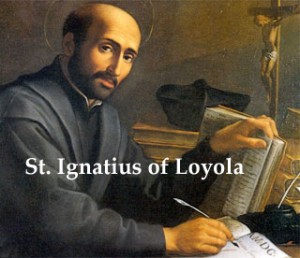 The Discernment of Spirits: Setting the Captives Free – Serves as an introduction to the Spiritual Exercises of St. Ignatius of Loyola
The Discernment of Spirits: Setting the Captives Free – Serves as an introduction to the Spiritual Exercises of St. Ignatius of Loyola
The 14 Rules for Discerning Spirits –
“The Different Movements Which Are Caused In The Soul”
as outlined by St. Ignatius of Loyola can be found here
Father Timothy M. Gallagher, O.M.V., was ordained in 1979 as a member of the Oblates of the Virgin Mary, a religious community dedicated to retreats and spiritual formation according to the Spiritual Exercises of St. Ignatius. Fr. Gallagher is featured on the EWTN series “Living the Discerning Life: The Spiritual Teachings of St. Ignatius of Loyola”.
For more information on how to obtain copies of Fr. Gallaghers’s various books and audio which are available for purchase, please visit his website: www.frtimothygallagher.org
For the other episodes in this series visit
Fr. Timothy Gallagher’s “Discerning Hearts†page
Tags: discernment of spirits, Father Timothy M. Gallagher, Timothy Gallagher
This entry was posted on Monday, February 24th, 2014 at 11:01 am
You can follow any responses to this entry through the RSS 2.0 feed.
FG#13 – The Way of Trust and Love Ep 2 – Fountains of Grace: reflections on contemporary spiritual classics with Donna Garrett
Join host Donna Garrett, with Fr. James Perez, LC, as they discuss the spiritual classic “The Way of Trust and Love: A Retreat Guided By St. Therese of Lisieux” by Fr. Jacques Philippe.
[powerpress]
Discussed in this episode, among other topics, from “The Way of Trust and Love”
The fact that we can’t save ourselves is something we acknowledge in words, but in fact we find it very hard to accept. We’d all like to be saved by our own efforts, to be strong and robust, to boast about our successes, to shine in other people’s eyes, even on the spiritual level. Worldly people want to be highly regarded because they have luxurious cars, expensive watches, designer clothes, professional prestige, and go around with beautiful people. As good Christians, we may want to stand out for our virtues, charisms, experience, and sound judgment. Then we consider that we are on the right path. But in fact we’re in danger of ending up with exactly the same mindset as the worldly people described above. Very often, without realizing it, we have a worldly outlook on the spiritual life: self-fulfillment, self-affirmation, expansion of ego, etc. And spiritual pride, we must be aware, is sometimes more destructive than social, worldly pride.
We cannot be saved by what we do; we can only be saved by grace, when God’s freely given love comes, takes hold of us, and transforms us, sometimes gently and progressively, but sometimes in a spectacular way. In general, the transformation is fairly slow and progressive, without our always being able to notice the action of grace.
Philippe, Jacques (2012-06-07). The Way of Trust and Love – A Retreat Guided by St. Therese of Lisieux (Kindle Locations 445-454). Scepter Publishers. Kindle Edition.
For other episodes in the this series click here “Fountains of Grace w/Donna Garrett“
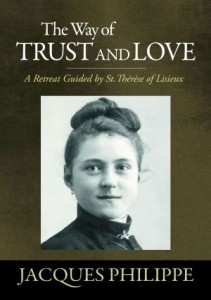
You can find “The Way of Trust and Love” here
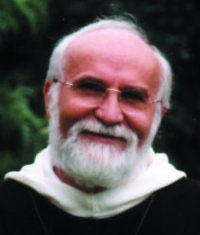
Fr. Jacques Philippe
Tags: catholic, catholic podcast, catholic prayer
This entry was posted on Monday, February 24th, 2014 at 3:51 am
You can follow any responses to this entry through the RSS 2.0 feed.
Gospel MT 5:38-48
Jesus said to his disciples:
“You have heard that it was said,
An eye for an eye and a tooth for a tooth.
But I say to you, offer no resistance to one who is evil.
When someone strikes you on your right cheek,
turn the other one as well.
If anyone wants to go to law with you over your tunic,
hand over your cloak as well.
Should anyone press you into service for one mile,
go for two miles.
Give to the one who asks of you,
and do not turn your back on one who wants to borrow.
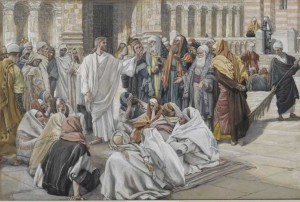 “You have heard that it was said,
“You have heard that it was said,
You shall love your neighbor and hate your enemy.
But I say to you, love your enemies
and pray for those who persecute you,
that you may be children of your heavenly Father,
for he makes his sun rise on the bad and the good,
and causes rain to fall on the just and the unjust.
For if you love those who love you, what recompense will you have?
Do not the tax collectors do the same?
And if you greet your brothers only,
what is unusual about that?
Do not the pagans do the same?
So be perfect, just as your heavenly Father is perfect.â€
Lectionary for Mass for Use in the Dioceses of the United States, second typical edition, Copyright © 2001, 1998, 1997, 1986, 1970 Confraternity of Christian Doctrine;
Tags: catholic, catholic podcast, catholic prayer
This entry was posted on Monday, February 24th, 2014 at 1:19 am
You can follow any responses to this entry through the RSS 2.0 feed.
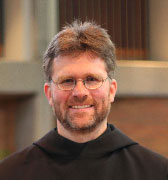 Episode 19 – The Holy Rule of St. Benedict: A Spiritual Path for Today’s World with Fr. Mauritius Wilde O.S.B., PhD.
Episode 19 – The Holy Rule of St. Benedict: A Spiritual Path for Today’s World with Fr. Mauritius Wilde O.S.B., PhD.
[powerpress]
In this episode, Fr. Maurtius is joined by his fellow Missionary Benedictines,  Sr. Fidelis Marie Lanowich 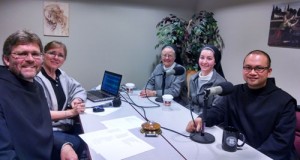 and Sr. Gabriel Mary Oestreich of the Immaculata Monastery, Norfolk, NE and Br. Damian Cayetano of Christ the King Priory, Schuyler, NE.  The group  discusses what drew them to the Holy Rule of St. Benedict.  They share their discernment process concerning their vocational call, the response of family and friends.  They discuss the experience of finding “home” within the life of their communities.
and Sr. Gabriel Mary Oestreich of the Immaculata Monastery, Norfolk, NE and Br. Damian Cayetano of Christ the King Priory, Schuyler, NE.  The group  discusses what drew them to the Holy Rule of St. Benedict.  They share their discernment process concerning their vocational call, the response of family and friends.  They discuss the experience of finding “home” within the life of their communities.
Father Mauritius Wilde, OSB, Ph.D., did his philosophical, theological and doctoral studies in Europe. He is the author of several books and directs retreats regularly. He serves as Prior of our monastery in Schuyler.
 For more information about the ministry of the the Missionary Benedictines of Christ the King Priory in Schuyler, Nebraska visit here:
For more information about the ministry of the the Missionary Benedictines of Christ the King Priory in Schuyler, Nebraska visit here:
Tags: Holy Rule of St. Benedict, Missionary Benedictines
This entry was posted on Thursday, February 20th, 2014 at 2:17 pm
You can follow any responses to this entry through the RSS 2.0 feed.
Dr. Matthew Bunson discusses the life, times and teachings of St. Gregory the Great part 2
Born: 540 AD, Rome, Italy
Gregory the Great, Pope (c. 540-604)
-Â Pastoral Rule
-Â Register of Letters
From Vatican.va, an excerpt from the teachings ofPope Benedict XVI General Audience 2008
In the theological plan that Gregory develops regarding his works, the past, present and future are compared. What counted for him more than anything was the entire arch of salvation history, that continues to unfold in the obscure meanderings of time. In this perspective it is significant that he inserted the news of the conversion of the Angles in the middle of his Book of Morals, a commentary on Job: to his eyes the event constituted a furthering of the Kingdom of God which the Scripture treats. Therefore, it could rightly be mentioned in the commentary on a holy book. According to him the leaders of Christian communities must commit themselves to reread events in the light of the Word of God: in this sense the great Pontiff felt he had the duty to orient pastors and the faithful on the spiritual itinerary of an enlightened and correct lectio divina, placed in the context of one’s own life.
Before concluding it is necessary to say a word on the relationship that Pope Gregory nurtured with the Patriarchs of Antioch, of Alexandria and of Constantinople itself. He always concerned himself with recognizing and respecting rights, protecting them from every interference that would limit legitimate autonomy. Still, if St Gregory, in the context of the historical situation, was opposed to the title “ecumenical” on the part of the Patriarch of Constantinople, it was not to limit or negate this legitimate authority but rather because he was concerned about the fraternal unity of the universal Church. Above all he was profoundly convinced that humility should be the fundamental virtue for every Bishop, even more so for the Patriarch. Gregory remained a simple monk in his heart and therefore was decisively contrary to great titles. He wanted to be – and this is his expression –servus servorum Dei. Coined by him, this phrase was not just a pious formula on his lips but a true manifestation of his way of living and acting. He was intimately struck by the humility of God, who in Christ made himself our servant. He washed and washes our dirty feet. Therefore, he was convinced that a Bishop, above all, should imitate this humility of God and follow Christ in this way. His desire was to live truly as a monk, in permanent contact with the Word of God, but for love of God he knew how to make himself the servant of all in a time full of tribulation and suffering. He knew how to make himself the “servant of the servants”. Precisely because he was this, he is great and also shows us the measure of true greatness.
For more visit Vatican.va
Dr. Matthew Bunson, Senior Fellow of the St. Paul Center for Biblical Theology, is one of the United States’ leading authorities on the papacy and the Church.
His books include: The Encyclopedia of Catholic History; The Encyclopedia of Saints; Papal Wisdom; All Shall Be Well; Encyclopedia of the Roman Empire; and The Angelic Doctor: The Life and World of St. Thomas Aquinas; The Pope Encyclopedia; We Have a Pope! Benedict XVI, the first Catholic biography of the Holy Father in the English language; the Encyclopedia of U.S. Catholic History; Pope Francis. His also the editor of OSV’s “The Catholic Answer” magazine.
Tags: matthew bunson, the Doctors of the Church
This entry was posted on Thursday, February 20th, 2014 at 12:40 pm
You can follow any responses to this entry through the RSS 2.0 feed.
THE WAY OF PERFECTION
By
St. Teresa of Avila
Chapter 17 & 18
[powerpress]
For the pdf containing the complete text and footnotes click here
How not all souls are fitted for contemplation and how some take
long to attain it. True humility will walk happily along the road
by which the Lord leads it.Continues the same subject and shows how much greater are the
trials of contemplatives than those of actives. This chapter offers
great consolation to actives
For other audio chapters of
“The Way of Perfection”
THE WAY OF PERFECTION
by
ST. TERESA OF AVILA
Translated & Edited by
E. ALLISON PEERS
from the Critical Editon of
P. SILVERIO DE SANTA TERESA, C.D.
Tags: st. teresa of avila, The Way of Perfection
This entry was posted on Thursday, February 20th, 2014 at 10:20 am
You can follow any responses to this entry through the RSS 2.0 feed.
It was with great joy we had the opportunity to talk with Fr. Thomas Dubay.  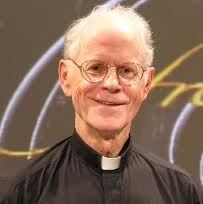   His work on “Fire Within” and all the programs he gave us on EWTN were instrumental in my spiritual growth. In those early days, he was like having a distant spiritual director who guided me, as well as the rest of us, toward a deeper relationship with Christ.
  His work on “Fire Within” and all the programs he gave us on EWTN were instrumental in my spiritual growth. In those early days, he was like having a distant spiritual director who guided me, as well as the rest of us, toward a deeper relationship with Christ.
[powerpress]
He told me once, “Kris, the best theology books are the lives of the saints; you study them and you won’t be led astray.”  Fr. Thomas Dubay, in a very real way, helped inspire the work of this blog and it’s mission.
Here’s a host of books by Fr. Thomas Dubay
Tags: catholic, catholic podcast, catholic prayer
This entry was posted on Thursday, February 20th, 2014 at 8:58 am
You can follow any responses to this entry through the RSS 2.0 feed.
Mortal Sin
[powerpress ]
 You know, we shouldn’t kid ourselves that we can’t earn God’s love. That’s about as foolish as a kid down the street trying to earn his way into my family by mowing my lawn every week. To be reborn in Christ is to be adopted as God’s son or daughter, 1 something that could never be purchased or earned.
You know, we shouldn’t kid ourselves that we can’t earn God’s love. That’s about as foolish as a kid down the street trying to earn his way into my family by mowing my lawn every week. To be reborn in Christ is to be adopted as God’s son or daughter, 1 something that could never be purchased or earned.
Nevertheless, there are still certain requirements for remaining part of that family. Just as a child can get himself kicked out of the house or even disinherited, so too we can separate ourselves from God’s grace through what the Church traditionally calls mortal sin.2 These sins can take the form of co-mmission, such as hatred or adultery, or o-mission, such as ignoring those in need or refusing to forgive someone.
Paul exhorts us in 1 Corinthians 10 to not be like the Israelites, who, in spite of having been liberated from the slavery of Egypt, baptized in the Red Sea, and fed with manna from heaven in the desert, failed to enter the Promised Land because of their disobedience.3
So if today you hear his voice, brothers and sisters, harden not your hearts!
1 -Â cf. 1 Jn. 3:1
2 -Â cf. Mt. 7:21; Rom. 6:21; 8:12; 1 Cor. 6:9-10; 7:19; Gal. 5:17-21; Js. 1:15; 1 Jn. 2:4; 3:22; 5:3; Rev. 2:5, 12:17; 14:12;
22:11; etc.
2 -Â 1 Cor. 10:1-6
Tags: catholic, catholic podcast, catholic prayer
This entry was posted on Thursday, February 20th, 2014 at 6:52 am
You can follow any responses to this entry through the RSS 2.0 feed.
Episode 4 -The Way of Mystery: The Eucharist and Moral Living 
Prayer and our active participation in the Mass: the introductory rite and the Liturgy of the Word
[powerpress]
For more episodes in “The Way of Mystery” Series click here
Deacon James Keating, PhD, the director of Theological Formation for the Institute for Priestly Formation, located at Creighton University, in Omaha, is making available to â€Discerning Hearts†and all who listen, his series of programs entitled “The Way of Mysteryâ€.
 The Vatican II documents remind us that the spiritual journey is not made in a vacuum, that God has chosen to save us, not individually, but as The People of God. The Eucharist must help Christians to make their choices by discerning out of Christ’s paschal mystery. For this process to take place, however, Christians must first understand how the Eucharist puts them in touch with Christ’s passion, death, and resurrection, and what concrete implications being in touch with this mystery has for their daily lives.
The Vatican II documents remind us that the spiritual journey is not made in a vacuum, that God has chosen to save us, not individually, but as The People of God. The Eucharist must help Christians to make their choices by discerning out of Christ’s paschal mystery. For this process to take place, however, Christians must first understand how the Eucharist puts them in touch with Christ’s passion, death, and resurrection, and what concrete implications being in touch with this mystery has for their daily lives.
For more information on the “Institute of Priestly Formation†and for other material available by Deacon Keating, just click here
Don’t forget to pickup a copy of “Communion with Christ†, it is one of the best audio sets on prayer…ever!
Check out Deacon Keating’s “Discerning Heart†page
Tags: institute for priestly formation, james keating, liturgy of the word, the eucharist, theological formation
This entry was posted on Wednesday, February 19th, 2014 at 2:20 pm
You can follow any responses to this entry through the RSS 2.0 feed.
Episode 10-Â The Church: Â Reflecting the Light of Christ
[powerpress]
Archbishop Lucas offers insights on the US Catholic Catechism for Adults Chapter 10:
The Church is the continuing manifestation of the Father, Son, and Holy Spirit. Â The Church exists by the will of God the Father and his plan to gather all people under the Lordship of his Son. Â As Head of the Church, Jesus Christ continues to fill her with his life and saving grace, pouring into her the Holy Spirit with his gifts of unity, peace, and love.
The Most Reverend George J. Lucas leads the Archdiocese of Omaha.Â
For other episodes in the visit our Archbishop George Lucas page
This programs is based on:
More information can be found here.
We wish to thank the USCCB for the permissions granted for use of  relevant material used in this series.
Also we wish to thank Omar Gutierrez and Teresa Monaghen  for their vocal talents in this episode.
Tags: Catholic Catechism, George Lucas, light of christ
This entry was posted on Wednesday, February 19th, 2014 at 1:55 pm
You can follow any responses to this entry through the RSS 2.0 feed.
Is Jesus Calling? A Spiritual Guide to Discerning Your Vocational Call with Fr. Paul Hoesing – episode 4:Â 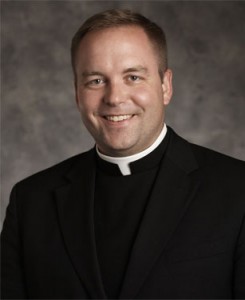
The Fourth Spiritual Lesson: It Takes Time. “The Father simply wants you to trust him enough to take the next step, not the 10th or 20th step. He wants you to focus on going from A to B, not on going from A to Z. When you take that step, Jesus will reveal the next one.”
Questions: What is the next step God is asking of you? Are you afraid to take it? If you are, ask him into the situation or reality that causes you fear. Are you focusing too far down the road?
[powerpress]
The Fifth Spiritual Lesson: Your Peace is Found in Jesus. “Christ’s presence is enjoyable; it gives us peace, stillness, clarity and gratitude. Our job is to desire it.”
Questions: Where do you experience peace, stillness, clarity or gratitude in God? Wherever that is happening in your life, you need to do two things: (1) realize that this is the presence of Christ and ; (2) desire it throughout your day…above all thins. Relish his presence, enjoy his presence, long fro his presence, keep coming back to his presence, adore his presence and express gratitude for his presence.
Based on “Is Jesus Calling You To Be A Catholic Priest: A helpful guide”, published by National Conference of Diocesan Vocation Director.
Fr. Paul Hoesing serves as the Vocation Director for the Archdiocese of Omaha, NE.
Check out “For Your Vocation.org“
Tags: Paul Hoesing, Spiritual Lesson
This entry was posted on Wednesday, February 19th, 2014 at 1:37 pm
You can follow any responses to this entry through the RSS 2.0 feed.




